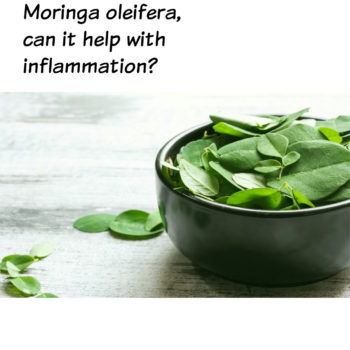Blog - Can Moringa Help With Inflammation?

What is inflammation?
What is inflammation, you ask? Can what I eat affect inflammation in the body, you wonder?
There are two types of inflammation observed in the body: acute and chronic. Acute inflammation is part of the immune system’s response to injury and infection. It is the body’s defense mechanism when bacteria and viruses are present, and the healing process is often over within a few hours or days. The inflammatory immune response is meant to bring damaged or sick areas back to normal health by destroying germs, taking away dead cells, and repairing damaged cells and tissue. Some examples of acute inflammation include a cut on the skin, swollen tonsils, an infected ingrown toenail, or bronchitis. So we can see that not all types of inflammation are harmful; acute inflammation is beneficial and even necessary.
Chronic inflammation, on the other hand, is stressful for the immune system and contributes to the development of atherosclerosis. Chronic inflammation sometimes begins as acute inflammation and then persists over time. This can happen when the immune system isn’t able to completely rectify the problem and then starts attacking healthy cells and tissues. Some examples of conditions that develop from chronic inflammation include cancer, rheumatoid arthritis, autoimmune diseases, and asthma.
Inflammation and Your Health
Chronic inflammation affects health and wellness because, as mentioned above, it can contribute to the development of disease over time. Atherosclerosis is especially problematic because it leads to even more severe problems such as stroke and cardiovascular diseases. Diet, family history, and lifestyle contribute to inflammation and the emergence of disease.
How can a person decrease and mitigate the effects of inflammation? For one, do not smoke. Not only do toxins in cigarettes increase inflammation, but they also weaken the body’s overall immune system. Unfortunately, second-hand smoke has the same effects. So it is crucial not to be downwind or near cigarette smoke.
Maintaining a healthy weight is also critical to managing inflammation. This is because excess fat directly contributes to the production of pro-inflammatory cytokines, one of the immune system’s “signaling” molecules — too many of these results in the over signaling of an inflammatory response.
There are numerous and compelling reasons to incorporate regular activity and exercise into your life, and decreasing inflammation is one of those reasons. Researchers at the University of California, San Diego, recently found that just one twenty-minute session of moderate exercise creates an anti-inflammatory cellular response. They found that even moderate exercise increases the production of TNF, a cytokine that regulates local and systemic inflammation and improves the overall immune response.
Nutrition and Inflammation
Weight gain increases the risk of chronic inflammation. So keeping weight within a healthy range is essential, and choosing healthy foods will help. Specific types of foods can increase or decrease inflammation. Inflammation protective foods are those that are high in antioxidants and polyphenols, such as leafy greens, olive oil, nuts, fruit, and fatty fish. The Mediterranean diet is one example of an anti-inflammation way of eating.
Inflammation-causing foods, on the other hand, include processed foods, soda, refined carbohydrates, and processed meat. You will want to avoid this when chronic inflammation is a concern.
Inflammation and Moringa
Studies have shown that Moringa oleifera contains dense amounts of phytochemicals, including isothiocyanates (ITCs) and flavonoids, which help to regulate oxidative stress in the body. Research has shown that oxidative stress activates inflammation, and a particular set of phytochemicals in foods helps to moderate it. One study published in March 2019 identified the specific isothiocyanate in Moringa that suppresses inflammation and reduces oxidative stress. More studies are being conducted to confirm the exact process of reducing inflammation markers. Read alongside each other, these studies tell us that there are tremendous nutritional benefits to regularly consuming Moringa.

Order Moringa Today!
Not only is Moringa great for decreasing inflammation, but it is also high in essential micronutrients, including calcium, zinc, iron, magnesium, potassium, and vitamins A and C. It is also a complete protein, contains fiber, and is packed with antioxidants! It’s no wonder that doctors and scientists have turned to Moringa as a solution for chronically malnourished populations.
VG Wellness has several formulations of Moringa so that you can consume this superfood regularly, either in the form of a powder, tea, or supplement. Be sure to read more on topical uses of Moringa. Our Moringa Body Balm, Organic Moringa Oil, and Moringa Lotion with Shea Butter are popular among those who enjoy the benefits of Moringa oleifera for their skin.
If you are looking for an all-natural way to boost your nutrition without having to use a chemically derived supplement, VG Wellness products are the answer! We deliver the most potent and natural supplements directly to your door. Supplementing your healthy lifestyle has never been more convenient!
No Description